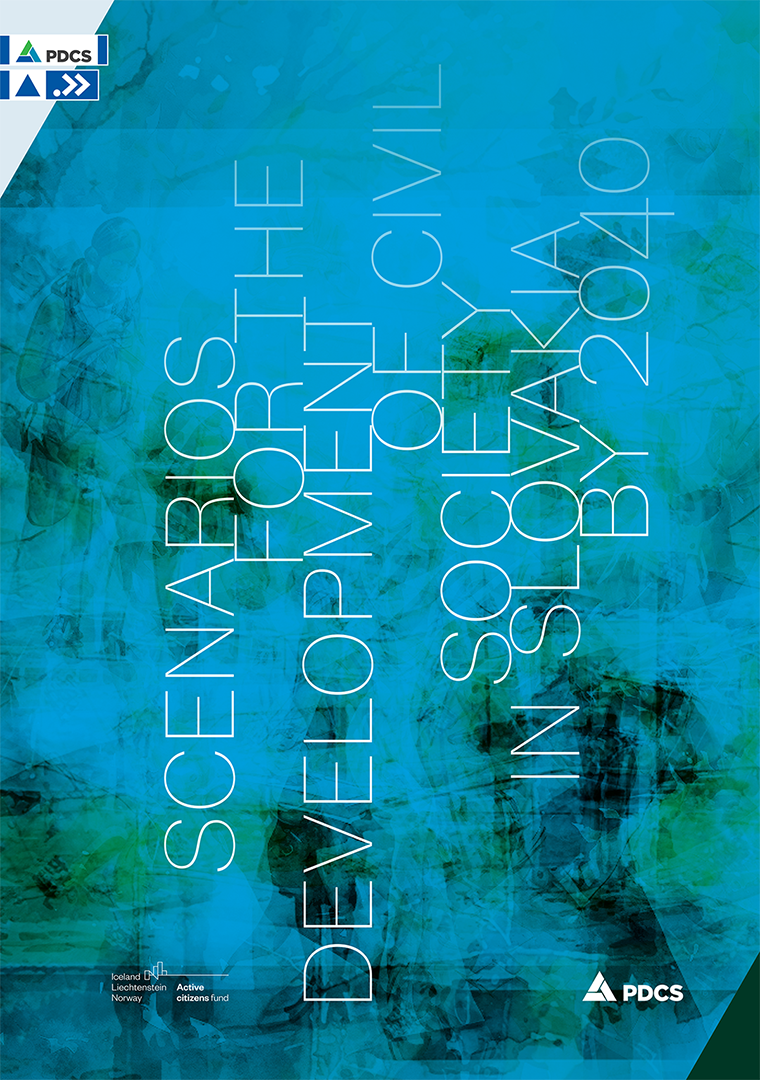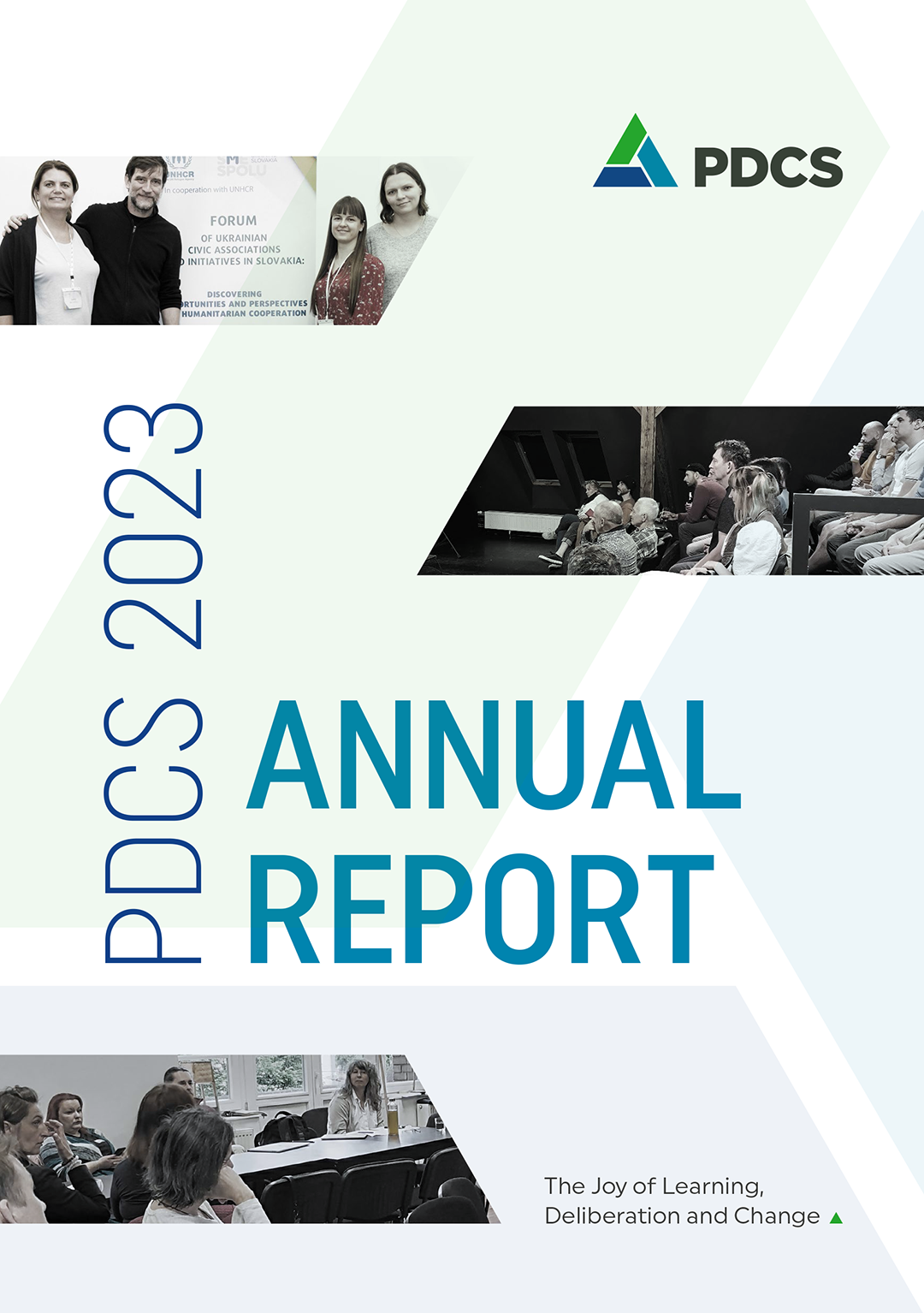
Scenarios for the Development of Civil Society in Slovakia by 2040
Sometime around 2019, we at PDCS started to focus on strengthening the resilience of civil society. In particular, we have considered the need to change the functioning of CSOs in relation to the globally deteriorating conditions for their activities (e. g. through changes in legislation restricting CSO funding or activities), and the declining trust of the public in the democratic institutions such as government, free press, and CSOs.
-
Available translations
-
Show more
At PDCS, we have been thinking for a long time about how to help CSOs, and civil society as a whole, to overcome the challenges of changing the way society functions – how to prepare in advance for what may come. Recent years have taught us that the ability and habit to ponder the versions of the future that we refuse to accept, even though they may come, is essential. If we do not know or even consider what our future might look like, we cannot prepare for it. If we do not know what can happen, we do not even think about how to prevent it.
Some may find the scenarios of possible futures in this publication oppressive and very pessimistic. They are not aimed to predict how civil society in Slovakia will look like in 2040, but rather to warn us not to ignore the changes that are already taking place. This is also what our future can look like, even if sometimes we do not want to see it.
A scenario is a ‘story’ that illustrates a vision of a possible future or aspects of a possible future. But scenarios are not predictions of the future. They should be perceived as simulations of possible future alternatives – in the context of current and future trends. The scenarios outlined are not the most likely ones. From the theoretically possible scenarios, we tried to choose the most inspiring ones. Their aim is to stimulate our thinking about how CSOs can function in different visions of the future.
The scenarios in this publication are based on political, economic, social, technological, legal, and environmental factors that will significantly influence the future. They are called drivers of change – how they eventually unfold will influence which of the imaginable futures we find ourselves in. The triggers of our thought experiment are not completely isolated – they may partially overlap. They constitute meaningful independent variables that help us think about the future. Scenarios are developed by a combination of multiple triggers that act in conjunction with each other and are logically interconnected in such a way that their joint action is conceivable. The role of triggers is not to provide a full explanation of all the causes and consequences – how the scenario might play out.
Scenarios can be developed qualitatively. They may examine relationships and trends for which no data are available, or with data that are only minimally quantifiable. Whether the scenarios are enriching, whether they are effective, depends on a number of factors. These factors are:
Probability: The scenario must be credible. This means that the world as it is and how it can develop must be taken into account – no sci-fi phenomena or apocalyptic events.
Consistency: The scenario must possess internal consistency. This means that the reader must be convinced that all the information contained in the scenario is easily traceable as global trends and that it is logically ordered and that individual events follow one another.
Usefulness for Decision Making: Each scenario/all scenarios together should help to enrich strategic decisions about what our world might look like if we decide to go down path 1 or path 2, and what the implications will be for the direction of society.
Scenarios can thus help leaders in both the public and civil sectors to think about the future when making public policy decisions. The method helps to consider a range of probable directions about where we are heading as a society, and how much influence we have to potentially correct or reverse that direction. Scenarios also help to stimulate creativity and get away from focusing too much on current and short-term problems.
Related articles
The publication was published within the project Scenarios for the development of civil society in Slovakia by 2040. Out Norwegian project partner Lillian Hjorth, director of Menneskerettighetsakademiet (Human Rights Academy) wrote an interesting reflection on the development and state of Norwegian civil society.
How to quote us
BATKOVÁ, Katarína (ed.). 2023. Scenarios for the Development of Civil Society in Slovakia by 2040 (online). Bratislava: PDCS, 2023. 64p. ISBN 978-80-89563-61-6.
-
Available translations
-
-
Would you like to contact us?
Are you interested in our services and you would like to establish cooperation with us? Are you looking for project partners in the topics we deal with? Contact us.
-
PDCS
Partners for Democratic Change Slovakia
